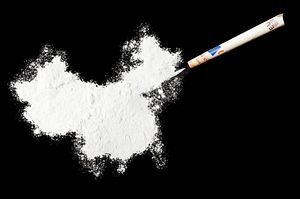Beijing in recent days has seen a major crackdown on illegal drug use. As Zach noted earlier, one of the highest profile names to get caught up in Beijing’s drug raids was none other than Jackie Chan’s son. The crackdown on drug use is part of a broader effort by the Chinese government to regulate vice and enforce anti-drug laws, at least in the nation’s capital. For now, it appears that Beijing police are making little effort to concentrate on domestic offenders — one account of a drug raid demonstrates that the police are indiscriminately targeting foreigners and Chinese alike.
Over at ABC, Stephen McDonell has a harrowing eyewitness account of what it’s like to be caught up in a Beijing-style drug bust. McDonell witnessed the Beijing police’s heavy-handed tactics first hand. According to his account, Beijing police raided a bar that was known to be popular with locals and foreigners alike and, after asking for identification, conducted a “random test” of the bar’s clientele for drugs.
“They took down everyone’s name, phone number, and settled for a passport number or ID number. I was asked who I worked for,” notes McDonell. After identifying everyone in the bar, Chinese or foreigner, the police reportedly asked everyone “to do an on-the-spot urine test.” McDonell describes the scene: “With toilet doors open police watched as we gave samples one by one. Women too had to squat with the toilet door open. A police woman would stand in the doorway and partially block the view of those who walked about in front of the stalls.”
The drug test administered allowed for the police to instantly observe a reaction that determined if one “failed” the test (specifically designed to detect marijuana use). After “failing,” some 10 individuals, including a few foreigners, were carted away by the police. As McDonell describes, the approach to drug-busting in this particular incident was inflexible: “People were not found to have sold drugs nor bought drugs. They were not guilty of carrying drugs. They were not caught taking drugs. They were judged to have, at some point in the past, smoked marijuana.”
From there, the police detained these “drug users,” from anywhere between 24 hours to up to two weeks in the case of some foreigners. For foreigners in China, these sorts of busts have important implications. Essentially, individuals can be found guilty of marijuana use and deported even if they can prove that they had ingested the drug in a country where it was legal. McDonell describes “a tourist who had only been in the country for two days” as one of the victims of the raid he witnessed.
So far, it seems that foreign embassies have been reaching out to their citizens that are caught up in these raids but there has been no public call for Beijing to moderate its approach to busting illegal drug users in China. The penalty for being found guilty of drug use is less severe in China than being found guilty of dealing or trafficking. The latter can lead to life in jail or execution.

































